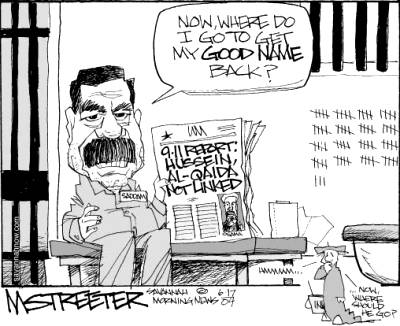

|
Your
Most Trusted Source of Foreign News and Views About the United States
|
By Elliot Jager
October 23, 2005

While the attention of Iraq-watchers was focused on the opening day of Saddam Hussein's trial, at about the same time, 10,000 kilometers away, U.S. Secretary of State Condoleezza Rice was testifying before the Senate Foreign Relations Committee on Capitol Hill. She was outlining, perhaps for the first time, the Bush administration's strategy for "victory" there.
The strategy is to clear out "the toughest places" so the enemy finds no sanctuary, and "to disrupt foreign support for the insurgents." Continued Rice: "We are working to hold and steadily enlarge the secure areas, integrating political and economic outreach with our military operations ... to build truly national institutions by working with more capable provincial and local authorities."


There's nothing wrong with this strategy; but with a mere 150,000 troops on the ground to control a violent 432,000 square kilometer country of 26 million people, you don't have to be Sun Tzu to figure out that this approach has probably come too late.
To understand just how bad things are, listen to the good news. Rice told the senators that compared to last year, "security along the once-notorious airport road in Baghdad has measurably improved."
Measurably, noch. You also don't have to be a Saddam-loving, antiwar-marching, Israel-bashing anarchist to recognize that "victory" is not an option.
The idea of attacking
Saddam did not have weapons of mass destruction,
despite the fact that the administration had "no doubt" he did.
Nor will

In the onslaught of Iraqi-datelined news
it's useful to step back and gain some perspective. The war was launched
in March 2003. On April 9, Saddam's 20-foot statue in Baghdad was brought down. The next day, Ken Adelman, one
of the neoconservative advocates of the war, wrote an op-ed in The Washington
Post gloating that prognostications about
That month the
On December
13, 2003,
The day after a new Iraqi government is
formed, and without fanfare,
Granted, it's possible that without
Which is why Rice warned the senators: "The terrorists want us to get discouraged and quit. They believe we do not have the will to see this through." But her boss never prepared the American people "to see this through." And he no longer has the credibility to do so.
Most Americans have given up on the war.
In the latest Associated Press-Ipsos poll, 61 percent said they disapprove
of Bush's handling of

If
And if the Shiite and Sunni parts explode, wake me up when it's over. Expect the tactical alliance between the Sunni (secular) Saddamites and the Sunni (Islamist) Zarqawites to unravel. The rival - and majority - Shiite factions led by Moqtada al-Sadr, Grand Ayatollah Ali Hussein al-Sistani and Ayatollah Mohammed Baqir al-Hakim may have their own intramural scores to settle, when they're not busy fighting the minority Sunnis. All this internecine conflict just might complicate life for the mullahs in Persian Iran.
So rather than become a haven for Islamic
fundamentalism,
And if we are pleasantly surprised - if
modernizing elites inside
Meanwhile, Israelis who wish
Perhaps the larger lesson of the Iraqi boondoggle is that the war against Islamist fascism was much too serious to be left in the hands of this administration. The next one will have to do better.